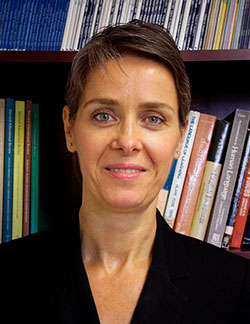 On behalf of the faculty, staff, and candidates of the Department of Education at The Catholic University of America, I invite you to explore this website about our community of researchers and reflective practitioners.
On behalf of the faculty, staff, and candidates of the Department of Education at The Catholic University of America, I invite you to explore this website about our community of researchers and reflective practitioners.
We seek to prepare candidates who have positive impact on all their students' learning and development. Upon graduation, our candidates possess deep conceptual understanding of their discipline, utilize a repertoire of effective pedagogical approaches to advance all their students' learning, have professional dispositions that reflect their belief that all students need to fulfill their highest potential, and are committed to understanding the uniqueness of all their students focusing on their strengths and meeting all their diverse needs.
Our reflective practitioner model, rooted in Catholic social justice teaching and contemporary cognitive science, cultivates candidates for their role as leader-practitioners. Catholic University's reflective practitioners constantly examine their thoughts, words, and actions and make decisions mindfully by considering educational dilemmas, numerous variables that impact student learning, and messages their decisions and actions send to various stakeholders. Throughout all teacher education programs, candidates utilize Catholic University's unique research-based reflective approach that enables them to continue growing professionally.
We prepare educators for the classroom and beyond: for Catholic schools, charter schools, public schools, private schools, higher education, or the government. A tradition of service to urban and Catholic education provides candidates with numerous opportunities to further their development as educational professionals. Our reflective model challenges candidates in whatever career they choose -- teachers, school and diocesan administrators, policy makers, or researchers.
Our undergraduate programs in Early Childhood Education, Elementary Education, and Secondary Education provide candidates with sound content knowledge, pedagogical content knowledge, skills, and experiences that shape reflective practice and lead to a teaching license. Candidates have practicum and student teaching experiences in local schools under the supervision of departmental faculty. Secondary education candidates in English, Mathematics, and Social studies connect with their major areas in an integrated approach.
Our graduate programs in Early Childhood Special Education, Special Education, and Secondary Education provide current practitioners or those new to the field with up-to-date research and its application to classroom practice. Graduate teacher education programs also lead to a teaching license in addition to a master's degree or a Graduate Teacher Certificate.
Our new master's degree program in Learning and Instruction is designed for graduate students from the United States and other countries with diverse academic interests and from diverse backgrounds who wish to study complex issues related to the teaching-learning process. Distinct from other master-level programs offered by the Department of Education, this program is designed as a non-teacher certification or non-licensure program; in other words, completion of this program does not lead to a teaching license from a state board of education in the United States.
Thank you for your interest in the Department of Education. Please feel free to contact us for more specific information about our programs.
Agnes Cave, Ph.D.
Chair, Department of Education
